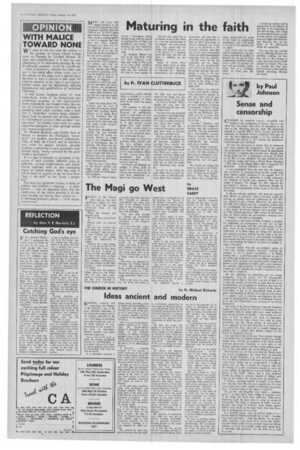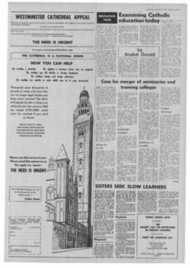Page 4, 14th January 1972
Page 4

Report an error
Noticed an error on this page?If you've noticed an error in this article please click here to report it.
Tags
Share
Related articles
Between Two Worlds And Two Churches
Standing Before The Latin Gate
P Iiii .11.11 Ii 119 Ii Ii Jpiiii Ii( Ii 1110 H Hommor....
Anglican Outcasts
Anglo-catholic High Noon
Maturing in the faith
by Fr. IVAN CLUTTERBUCK
MANY will know that Anglo-Catholics in the Church of England have held congresses regularly since the 1914-18 war. In 1923 a great man, Bishop Weston of Zanzibar, made a rousing speech to such a congress and said that now many Catholic privileges had been won for the Anglican Church it was the duty of all to take the Faith out of their churches to the rest of the country.
In the introduction to the record of that 1923 Congress, the editors said that for spreading the Faith in our country, among other things, "we need an apostolate of the laity in England such as we begin to see in France, in Holland. in Belgium — an apostolate in which the miner and the merchant, the sailor, the teacher, the ploughman, the City clerk, have.resolved to make their Christian witness the first and most urgent obligation in all their hu§iness."
Little was done about this,, however, and like most of Catholic Christendom church people left anything faintly religious to the clergy. Even on the Continent the lay apostolate movement went forward in fits and starts and only made steady progress after the last war.
Meanwhile, throughout our country. the gap between church and the nation increased. People no longer lived in the community, the soil of Christianity, but in mobility. The shape and size of parishes changed and the clergy were no longer able to keep in touch with their parishioners who were always on the move both for their daily work and home life.
This has had a bad effect on the clergy's morale, and many young priests have quickly opted out of the parochial situation. started a movement, chiefly for the young, with the objects of learning love of God and neighbour, and leisure. The learning side was considered to be of the utmost importance.
As Anthony Bloom has said in his new book "God and Man" (Darton, Longman and Todd, £1.50), most of us face adult problems with the faith of a child of eight who has collected all the faith he was capable of and formed a world outlook which is childish. So a year's study programme of basic facts of the Faith was made available.
The response to this new movement was staggering. Requests for information about it came from all over the world. At present we have about 400 parishes interested in it and several actual groups have been formed. ' Soon older people asked to join in and we found ourselves in an apostolate situation embracing all ages.
At this stage we looked for guidance from abroad, and this was willingly given especially by the French and Belgians. Although the situation in those countries differs in some respects from ours, nevertheless their Catechumenat and JEC work has much to teach us.
In France and Belgium an attempt is being made to climb over the walls of the Church and systematically to meet those completely isolated from Christianity. The first idea which has to be broken down is that there is a two-tier membership of the Church— first and second class. This means that the clergy and religious are not to be placed in a category above the laity but that all share a ministry in the Church.
Some, of course, have special duties given to them at their ordination, but these are relatively few— blessing, consecrating and absolving.
The laity may and should share in the liturgy and also be missionaries to the world.
As Vatican II said: "Many people can only hear the Gospel through the laity who live near them."
Yet how have we prepared our people for speaking about their Faith? Scarcely at all. For many centuries the clergy have given their people, at some stage of their life. a course of instruction and then sent them away to practise their own spiritual lives.
This is a luxury we can no longer afford. We need to use all resources available in reaching those outside the Church. Imagine a number of young people who have ended their three-year course at a teachers' training college and are told by the principal that they have done well but that there are no jobs for them! How frustrated they would be.
Yet are we not doing the same thing when we give our laity—some as well educated, if not better than ourselves—
instruction and then fail to give them the opportunity to pass on their knowledge to others? Certainly the young want to be involved in the Church's mission. and they will be the more encouraged if they see older churchpeople exercising their lay ministry.
At the centre of the lay apostolate are the clergy. These are the professionals who will act as tutors to the lay groups and see that each person is used in the best possible way. This movement must surely strengthen the morale of the clergy if they can see their training properly used.
The primary aim must be to give each parish a permanent structure for mission. In this way there will be real growth of the Church. Here one ought to say that as far as each individual Christian is concerned "Church" means the local congregation gathered for the Eucharist, presided over by a priest who receives his authority from the bishop.
-Growth," therefore, will be seen when extra people are brought into this eucharistic assembly. The lay apostolate has a responsibility towards those at present outside the Church, towards the local congregation and towards each group member.
The last person is important. The laity will not be able to carry out their ministry if they are not adequately prepared. The first years of apprenticeship are all-important.
We should not forget the boost to morale to the individual churchgoer. In a new book "A Rumour of Angels" (Pelican, 25p), Peter Berger has shown how a lonely be liever, surrounded for much of his week by unbelieving neighbours, may well begin to wonder if the majority are not right.
This could sap his faith until he surrenders to the prevailing unbelief or apathy. If however he can go out from a supporting apostolate group with a sense of mission, he may well see faithless public round him as a challenge which he must and can accept. I would do well to end by saying that in our Church we are only at the beginning of this new strategy, and it may be years before we see results. If local priests and congregations are happy with their present situation, they are unlikely to be enthusiastic about the apostolate.
One can only say parishes of very differing character are seriously working out how they can use this strategy to reach out to the many people outside the Church. They can be assured that they have many partners in the Catholic Church stretching through the world.
blog comments powered by Disqus











